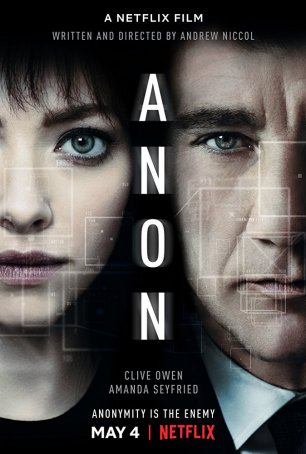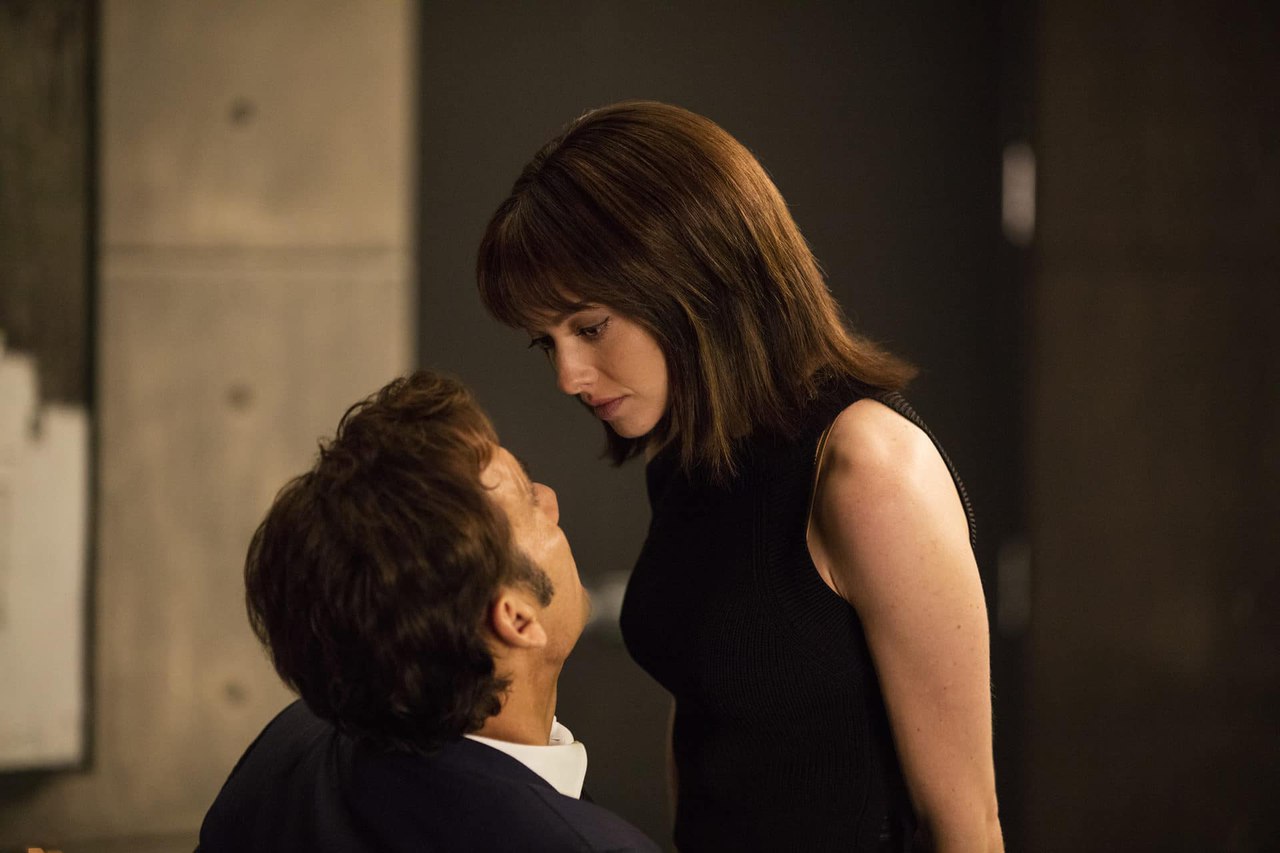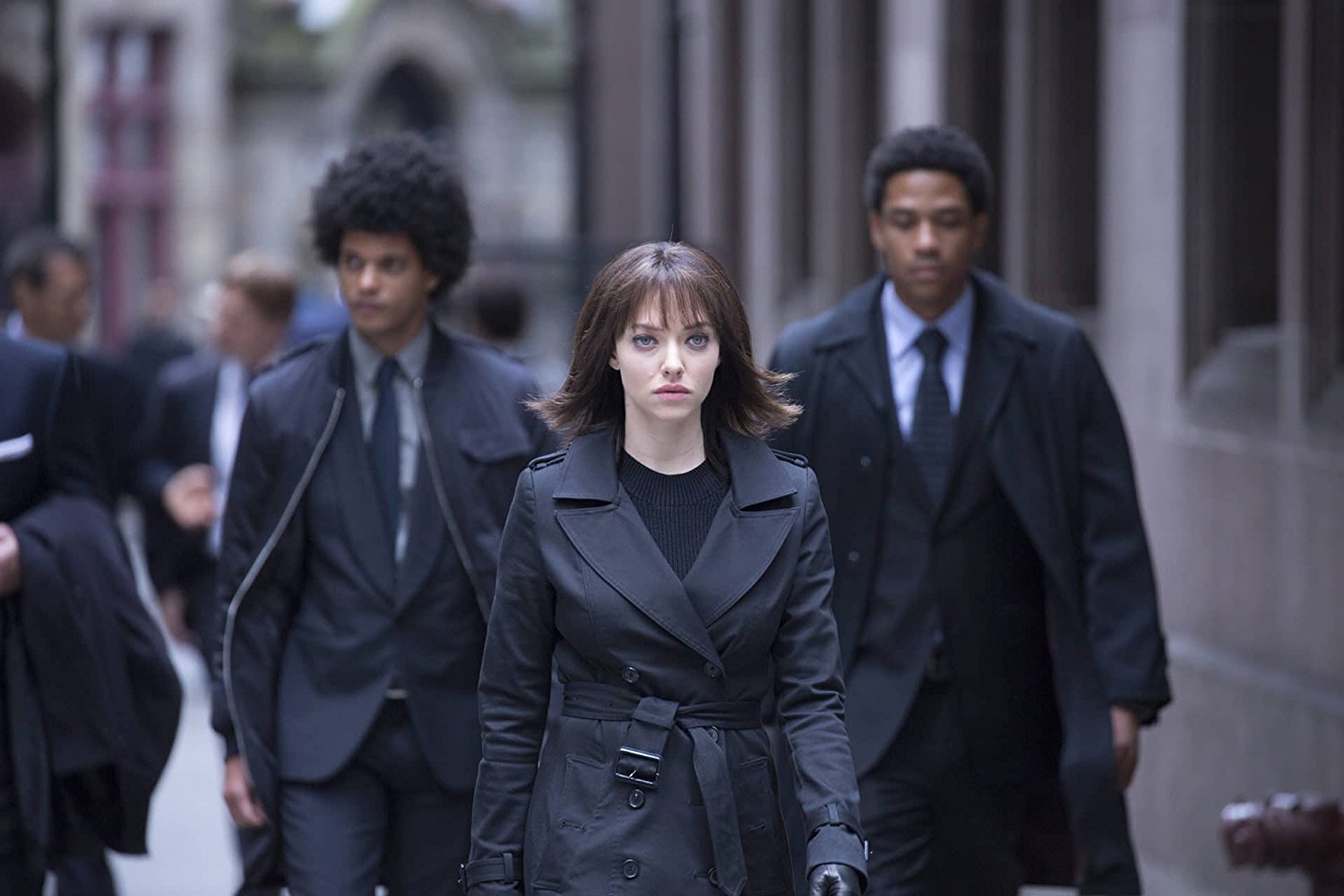Anon (Germany, 2018)
May 06, 2018
You don’t have to look too far or to deep to find the similarities among writer/director Andrew Niccol’s three science fiction films (I’m ignoring The Host, which is more Stephanie Meyer than Niccol). Like Gattaca and In Time, Anon boasts tremendous “world building.” Niccol’s tech-heavy view of the future strays far from the dystopian wasteland and ultra-flashy perspectives favored by science fiction films. Like Steven Spielberg’s Minority Report, it seems credible. However, while Gattaca boasted the complete package, In Time was lacking when it came to the storyline; that flaw plagues Anon as well. A standard-order noir murder mystery with a confused, contrived last act, Anon is more notable for how it sees the future than what it sees going on there.
The movie opens with an 1835 quote from Robert Browning: “I give the fight up; let there be an end, A privacy, an obscure nook for me. I want to be forgotten even by God.” Although a little on the pretentious side, it’s an accurate reflection of the mindset of Anon’s antagonist, who finds the normalcy of the future to be more intrusive and suffocating than beneficial.
 In the world of Anon, there
are no flying cars, no protective domes, no cloud-topping skyscrapers. Instead,
things look pretty much as they do today (seen through a desaturated, nearly
monochromatic filter) – at least until you gaze out through the eyes of the characters.
In this future, every human’s visual cortex is plugged into a massive computer
network – a next-gen Internet called the “Ether” – and every image glimpsed by
the eyes is recorded and stored, immediately available for replay by the owner
or, in some cases, others. This capability has become a boon in many areas of
society from the frivolous to the grave. It disallows duplicity and has made
solving murders a mundane job. After all, the cops have access to last thing
the deceased saw and how his or her last moments went down.
In the world of Anon, there
are no flying cars, no protective domes, no cloud-topping skyscrapers. Instead,
things look pretty much as they do today (seen through a desaturated, nearly
monochromatic filter) – at least until you gaze out through the eyes of the characters.
In this future, every human’s visual cortex is plugged into a massive computer
network – a next-gen Internet called the “Ether” – and every image glimpsed by
the eyes is recorded and stored, immediately available for replay by the owner
or, in some cases, others. This capability has become a boon in many areas of
society from the frivolous to the grave. It disallows duplicity and has made
solving murders a mundane job. After all, the cops have access to last thing
the deceased saw and how his or her last moments went down.
When Detective Sal Frieland (Clive Owen) is handed a genuine whodunnit? by his boss, Charles Gattis (Colm Feore), he’s not entirely sure how to go about solving the case. It seems that someone has figured out how to hack into the Ether and is changing victims’ last images. Sal eventually comes up with a suspect (Amanda Seyfried), a dark-haired girl whose hacker resume is second-to-none, but tracking down someone off-grid is nearly impossible. So he goes undercover and sets himself up as a target. He gets more than he bargained for, especially when the girl realizes his identity.
While Anon doesn’t boast a superior story, it’s engaging in the way many B-grade noir films from the ‘40s and ‘50s were – pulpy excursions into the dark side of human nature with hard-bitten heroes and duplicitous femmes fatale. There’s a bit of Humphrey Bogart in the way Clive Owen attacks his role and, although Amanda Seyfried isn’t provided with sufficient screen time or depth to make her character into a compelling individual (she doesn’t even have a name), she at least looks the part. Many of the plot points echo those that might have anchored a forgotten black-and-white potboiler.
 Anon uses a lot of
first-person points-of-view, allowing the viewer to see through the eyes of the
character – shots that involve a wealth of on-screen text. These scenes show
how easy it is to distort an individual’s perspective for someone with access. During
one subway chase, Sal is nearly killed twice not by bullets but by things that
aren’t there. He takes a tumble down a flight of stairs and is nearly hit by a
train. When he recounts his experience to his superior, he emphasizes that,
although the visual record shows nothing untoward, he remembers seeing things differently. Later, as the killer doubles
down and gets serious about torturing and removing Sal, the detective finds
memories of his dead son deleted and sees burning hallways where there’s no
fire and safe intersections where there’s heavy traffic.
Anon uses a lot of
first-person points-of-view, allowing the viewer to see through the eyes of the
character – shots that involve a wealth of on-screen text. These scenes show
how easy it is to distort an individual’s perspective for someone with access. During
one subway chase, Sal is nearly killed twice not by bullets but by things that
aren’t there. He takes a tumble down a flight of stairs and is nearly hit by a
train. When he recounts his experience to his superior, he emphasizes that,
although the visual record shows nothing untoward, he remembers seeing things differently. Later, as the killer doubles
down and gets serious about torturing and removing Sal, the detective finds
memories of his dead son deleted and sees burning hallways where there’s no
fire and safe intersections where there’s heavy traffic.
Anon raises the question of whether it’s possible to recommend a film based entirely on how well the director has assembled the universe in which the action transpires. Anon’s storyline is forgettable and the movie ends with an unsatisfying mixture of confusion and predictability. (Character conservation plays a big part in this.) But the film as a whole never loses its sense of fascination because, as futuristic as the Ether is, it seems plausible and that plausibility gives Anon an almost-prophetic vibe. Its easy availability on Netflix takes away the need to travel to a theater and pay the price of admission, tilting the needle in the direction of giving it a chance. Twenty years after his debut, Niccol may still be trying to equal what he achieved with Gattaca and, although Anon falls considerably short, its Orwellian reality demands consideration if not immersion.
Anon (Germany, 2018)
Cast: Clive Owen, Amanda Seyfried, Colm Feore, Daniel Stolfi
Screenplay: Andrew Niccol
Cinematography: Amir Mokri
Music: Christophe Beck
U.S. Distributor: Netflix
U.S. Release Date: 2018-05-04
MPAA Rating: "NR" (Violence, Sexual Content, Nudity, Profanity, Drugs)
Genre: Science Fiction/Thriller
Subtitles: none
Theatrical Aspect Ratio: 2.35:1
Comments